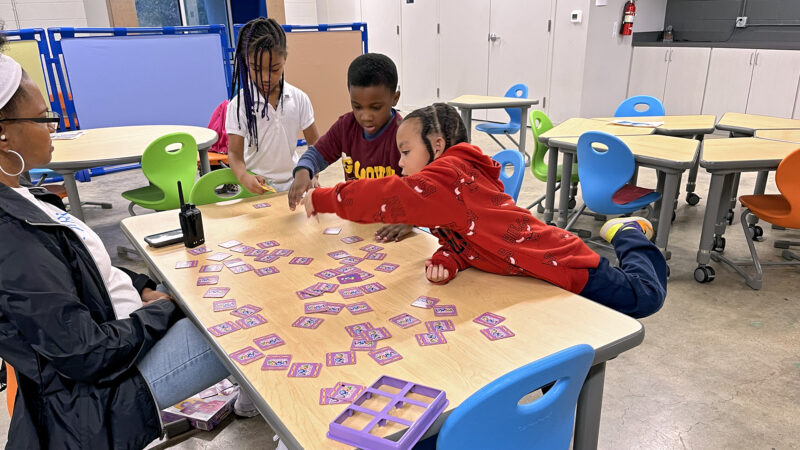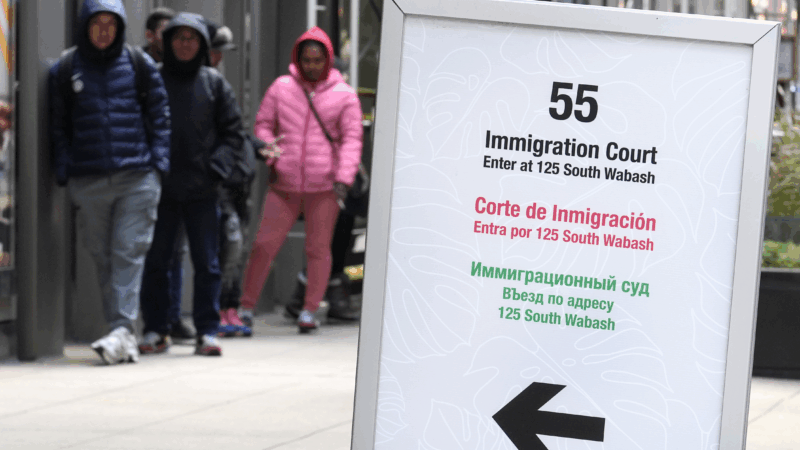The Gulf South’s rejection of the Summer EBT program puts further strain on child hunger issues
Children in Operation Shoestring’s Project Rise after-school program play a game at the program’s center in Jackson, Mississippi, on January 26, 2024. Children who attend the program receive enrichment and educational support. During the summer, they also get free meals.
This summer, children in the Gulf South will miss out on a federal program that provides low-income families with extra cash for groceries while school is out of session.
In mid-January, the U.S. Department of Agriculture announced that the Summer Electronic Benefit Transfer program, or Summer EBT, which carried many lower-income families through the COVID-19 pandemic will become permanent. The program will give families an extra $120 per eligible child on EBT cards for the summer — averaging out to $40 per month.
But kids in the Gulf States won’t see any of those funds this summer. In Louisiana and Mississippi, state leadership declined to expand the program. Alabama missed the deadline to set aside funds for their half of the expansion, which would have totaled millions of dollars.
About a third of families living below the poverty line in America suffer from food insecurity, research from the USDA shows. In Louisiana and Mississippi, the rate is higher than the national average.
Carol Gundlach is a senior policy analyst for Alabama Arise, a nonprofit that focuses on people living in poverty. She said that while food insecurity affects poor people the most, Black families are impacted more heavily.
“In Alabama, 14% of Alabama households had reported in October that they sometimes, or often, did not have enough food to eat,” Gundlach said. “21% of Black households in Alabama — and these are families with children specifically — reported they didn’t have enough to eat sometimes or often.”
Many of the children who qualify for free and reduced lunches often don’t have much food available at home, which makes having Summer EBT an important supplement. But Gundlach said families need more than that.
“Summer EBT is a good first step, ” she said. “It’s going to be helpful, but it’s not going to solve all the problems of the world.”
One organization hoping to fill the gaps for children struggling in poverty is Operation Shoestring, a non-profit that creates enrichment and educational programming for children in Jackson, Mississippi. The kids they serve come from lower-income communities across the city or are at a higher risk of falling behind in school.
Studies show that hungry children find it more difficult to learn. Robert Langford, Operation Shoestring’s executive director, said that’s true of the kids who are in Project Rise, the organization’s after-school program.
“In order to do well academically, you’ve got to have some food in your belly that’s nutritious, that feeds you and sustains you,” Langford said. “That is a struggle. It’s a constant struggle for our families.”
During the summer, Operation Shoestring runs a day program and also acts as a food hub. Kids can eat breakfast there, take field trips and are shuttled to one of the local public schools that provides summer lunches through the USDA Summer Food Service Program.
Langford said coordinating transportation can be difficult, and there aren’t many feeding sites around the city. Many families also don’t know this resource is available.
“If we’re serving a couple hundred kids, think how many kids aren’t being served,” he said.
Summer EBT would have supplemented the cost of groceries while kids are home for the summer, giving parents more room for bills such as utilities or rent.
“Since the pandemic and since interest rates have risen, we’ve seen grocery prices go through the roof. That’s on top of having to deal with Mississippi’s grocery tax,” Langford said. “Bearing the cost of feeding your child and feeding yourself, if you are a parent, has gotten much harder.”
Gundlach said advocates in Alabama will continue to urge state leaders to look at other avenues to bolster social safety nets, like increasing SNAP or expanding Medicaid.
“There are all kinds of improvements they could make that make it easier for people to get food assistance,” Gundlach said. “There are things Congress could do that make it harder for families to get food assistance, and they’re going to be debating that. It’s going to be critically important, especially in states like Mississippi, Alabama and Louisiana — where people are struggling so hard.”
This story was produced by the Gulf States Newsroom, a collaboration between Mississippi Public Broadcasting, WBHM in Alabama, WWNO and WRKF in Louisiana and NPR.
Nancy Guthrie search enters its second week as a purported deadline looms
"This is very valuable to us, and we will pay," Savannah Guthrie said in a new video message, seeking to communicate with people who say they're holding her mother.
Immigration courts fast-track hearings for Somali asylum claims
Their lawyers fear the notices are merely the first step toward the removal without due process of Somali asylum applicants in the country.
Ilia Malinin’s Olympic backflip made history. But he’s not the first to do it
U.S. figure skating phenom Ilia Malinin did a backflip in his Olympic debut, and another the next day. The controversial move was banned from competition for decades until 2024.
‘Dizzy’ author recounts a decade of being marooned by chronic illness
Rachel Weaver worked for the Forest Service in Alaska where she scaled towering trees to study nature. But in 2006, she woke up and felt like she was being spun in a hurricane. Her memoir is Dizzy.
Bad Bunny makes Puerto Rico the home team in a vivid Super Bowl halftime show
The star filled his set with hits and familiar images from home, but also expanded his lens to make an argument about the place of Puerto Rico within a larger American context.
Japan’s Takaichi to pursue conservative agenda after election landslide
Japan's first female Prime Minister, Sanae Takaichi, brought the ruling Liberal Democratic Party its biggest-ever electoral victory, fueling her ambitions to pursue to a political agenda which she says could "split public opinion."







